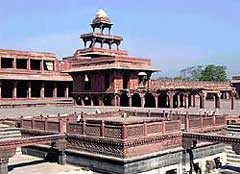The Mughal Empire
Religious Policy
Akbar rose to fame in the pages of history due to his religious policy. Various factors were responsible for his religious ideas. The most important among them were his early contacts with the sufi saints, the teachings of his tutor Abdul Latif, his marriage with Rajput women, his association with intellectual giants like Shaikh Mubarak and his two illustrious sons – Abul Faizi and Abul Fazl – and his ambition to establish an empire in Hindustan.
 |
| Fatehpur Sikri |
In 1575, he ordered for the construction of Ibadat Khana (House of worship) at his new capital Fatepur Sikri. Akbar invited learned scholars from all religions like Hinduism, Jainism, Christianity and Zoroastrianism. He disliked the interference of the Muslim Ulemas in political matters. In 1579, he issued the “Infallibility Decree” by which he asserted his religious powers.
Information related to the search:
The Mughal Empire, india, history, mughal, religious, akbar, policy, empire, muslim, abolished, rajput, abul, sikri, worship, &ndash, later, pilgrim, jiziya, rajputs, rose, important

